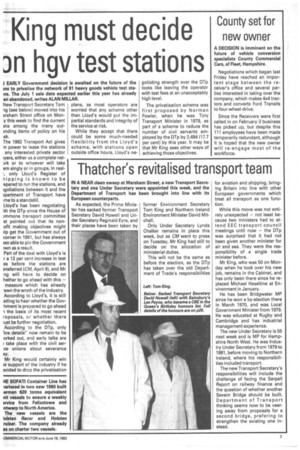King must decide 3n hgv test stations
Page 5

If you've noticed an error in this article please click here to report it so we can fix it.
1 EARLY Government decision is awaited on the future of the ins to privatise the network of 91 heavy goods vehicle test stains. The July 1 sale date expected earlier this year has already en abandoned, writes ALAN MILLAR.
New Transport Secretary Tom ng (see below) moved into his arsham Street office on Mony this week to find the current 3ns among the many out3nding items of policy on his sk.
The 1982 Transport Act gives rn power to lease the stations any interested private sector iyers, either as a complete net)rk or to whoever will take em singly or in groups. In real', only Lloyd's Register of nipping is known to be epared to run the stations, and igotiations between it and the 3partment of Transport have ime to a standstill.
Lloyd's has been negotiating ith the DTp since the House of )mmons transport committee st pointed out that its nonofit making objectives might 3Ip get the Government out of corner in 1981, but has always 3en able to pin the Government )wn as a result.
Part of the deal with Lloyd's is r a 12 per cent increase in test es before the stations are ansferred (CM, April 9), and Mr ng will have to decide on hether to go ahead with this — measure which has already .awn the wrath of the industry. According to Lloyd's, it is still aiting to hear whether the Govnment is prepared to go ahead
the basis of its most recent roposals, or whether there rust be further negotiation.
According to the DTp, only The details" now remain to be orked out, and early talks are take place with the civil serce unions about severance ay.
Mr King would certainly win le support of the industry if he ecided to drop the privatisation plans, as most operators are worried that any scheme other than Lloyd's would put the impartial standards and integrity of the service at risk.
While they accept that there could be some much-needed flexibility from the Lloyd's scheme, with stations open outside office hours, Lloyd's ne gotiating strength over the DTp looks like leaving the operator with test fees at an unacceptably high level.
The privatisation scheme was first proposed by Norman Fowler, when he was Tory Transport Minister in 1979, as part of a scheme to reduce the number of civil servants employed by the DTp by 2,484(17.7 per cent) by this year. It may be that Mr King sees other ways of achieving those objectives.








































































































